
The culture of Chile reflects the population and the geographic isolation of the country in relation to the rest of South America. Since colonial times, the Chilean culture has been a mix of Spanish colonial elements with elements of indigenous culture, as well as that of other immigrant cultures.
A roots revival is a trend which includes young performers popularizing the traditional musical styles of their ancestors. Often, roots revivals include an addition of newly composed songs with socially and politically aware lyrics, as well as a general modernization of the folk sound.

The music of Mexico is highly diverse, featuring a wide range of musical genres and performance styles. It has been influenced by a variety of cultures, primarily deriving from Europeans, Indigenous, and Africans. Music became an expression of Mexican nationalism starting in the nineteenth century.

Violeta del Carmen Parra Sandoval was a Chilean composer, singer-songwriter, folklorist, ethnomusicologist and visual artist. She pioneered the Nueva Canción Chilena, a renewal and a reinvention of Chilean folk music that would extend its sphere of influence outside Chile.
Chilean music refers to all kinds of music developed in Chile, or by Chileans in other countries, from the arrival of the Spanish conquistadors to the modern day. It also includes the native pre-Columbian music from what is today Chilean territory.
"Summertime" is an aria composed in 1934 by George Gershwin for the 1935 opera Porgy and Bess. The lyrics are by DuBose Heyward, the author of the novel Porgy on which the opera was based, and Ira Gershwin.
Luis Advis Vitaglich was a Chilean professor of philosophy, and a noted composer of traditional and New Chilean music. He was officially recognized as a fundamental figures of Chilean music in 2003.

La Población is the seventh studio album by Chilean singer-songwriter Víctor Jara, released in 1972 by DICAP, and Odeon labels.
Cinco canciones populares argentinas are a set of five songs for voice and piano, comprising both entirely new compositions as well as new settings of existing melodies, written in 1943 by Argentine composer Alberto Ginastera as his opus 10. The five songs are as follows:

Margot Loyola Palacios was a musician, folk singer and researcher of the folklore of Chile and Latin America in general.
Rodrigo F. Cádiz is a composer and engineer from the Pontificia Universidad Católica de Chile, where he studied with Alejandro Guarello, Aliosha Solovera and Pablo Aranda. He obtained his Ph.D. in Music Technology from Northwestern University in 2006, where he studied with Augusta Read Thomas, Jay Alan Yim, Virgil Moorefield, Amnon Wolman and Gary Kendall.

El Quisco is a Chilean city and commune in San Antonio Province, Valparaíso Region. Located in the country's central coast, it serves as a popular summer resort for the population of Santiago and forms part of the Coast of Poets, a cultural space named after four world-renowned Chilean poets: Pablo Neruda, Vicente Huidobro, Violeta Parra and Nicanor Parra. El Quisco is home to La Casa de Isla Negra, the former house of Chilean poet Pablo Neruda, which is now a museum and Neruda's burial site.

Ester Soré was the main singer of Chilean melodies of the 20th century. She recorded for the first time, the successful one "Chile Lindo" ("Pretty Chile"), of Clara Solovera, and did not only contribute to enriching the way to interpret those songs thanks to a voice recognized among the clearest and expressive of her time. Besides she was a popular artist in an extensive sense: on the radio, recordings, tours and movies.

Los Huasos Quincheros are a popular Chilean folk musical group, first formed in 1937. It currently consists of the musicians Antonio Antoncich, Jose Vicente Leon and Rafael Prieto. The group was nominated for an International Music Prize in 1970.
The tonada is a folk music style of Spain and some countries of Hispanic America. In modern-day Spain, the traditional sung piece known as tonada is considered as having been originated in Asturias and Cantabria, although tonada is a Spanish word which can mean anything sung, played or danced, musicological usage in Spanish and English is more specific.

The Coast of Poets is a cultural space in the Valparaíso Region of Chile, named for four world-renowned Chilean poets.
Esperanza is a 2011 Chilean telenovela produced and broadcast by TVN.

Sofia Asunción Claro is a Chilean-born classical harpist with a special interest in contemporary music. Since 1974, she has divided her time between Copenhagen, Denmark and Santiago, Chile.
Francisco Flores del Campo, also known as Pancho Flores, was a Chilean composer, instrumentalist and actor, considered one of the most relevant composers of popular music in the country. He won the folk competition of the Viña del Mar International Song Festival in 1964 with the tune "Qué bonita va", performed by Los Huasos Quincheros.








